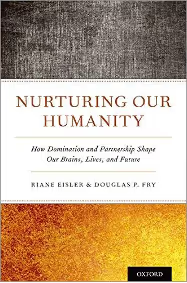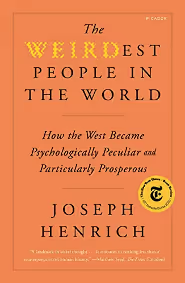The ProSocial Commons is pleased to announce the formation of an online Book Club. The only thing more pleasurable and instructive than reading a good book on your own is being able to discuss it with others! We are organizing the book club so that groups can form around any book nominated by a PC member that attracts a quorum of interest.
For each book, a Zoom link and Hylo.com site will be made available to organize the group’s activities. This means that discussions can take place asynchronously and a flexible Zoom meeting schedule can be decided upon by the group.
A Book Club Stewardship Circle has formed, whose members have experience with book clubs. They have nominated nine books to get the ball rolling, which are listed below. If you would like to join one or more of these groups, then go here to register your preference. Once interest in the books is assessed, the SC will proceed to initiate the groups. If many of you express interest in the same two or three books, the SC will space out the schedule to give members a chance to participate in multiple discussions.
Not yet a member of the ProSocial Commons? No problem! Go here to learn more and to join. You can join a book club immediately upon becoming a PC member.
The initial trial run will help us to come up with a procedure for PC members to nominate other books and to schedule discussions so that they do not compete with other high-interest selections. Any book relevant to an evolutionary worldview and the vision of ProSocial World is fair game. To get started, we propose the below books representing fiction and non-fiction, human-centered and nature-centered, written for the layperson and written for the expert. Groups may also choose to discuss a collection of materials rather than a single book. Rather than place limits on what can be nominated, the interest of PC members in joining a group can drive the selection process.
Finally, it is our hope that at least some PC Book Club groups will be action-oriented. In other words, what can be done on the basis of the material that has been read and discussed? In this fashion the discussion of each book can contribute to other present and future initiatives within the PC and ProSocial World.
Registration is open until Nov 7, followed by discussions on Hylo for books that have reached a quorum. Getting involved at this stage will engage you in the formation of the PC Book Club as a whole, in addition to the group(s) reading the book(s) of your choice.

The Gene’s Eye View of Evolution, by J. Arvid Agren (Oxford University Press, 2021). This book is the latest scholarly assessment of the concept of selfish genes made so popular by Richard Dawkins in 1976. Dawkins himself offered the following praise: “Arvid Ågren has undertaken the most meticulously thorough reading of the relevant literature that I have ever encountered, deploying an intelligent understanding to pull it into a coherent story. As if that wasn't enough, he gets it right.” Yet, a careful reading of the book reveals the concept of selfish genes to be much more limited than Dawkins’ aspirations and far from the drop-dead argument against group selection that it was originally taken to be. This group will take a “deep dive” into the subject, comparable to a graduate seminar, but Agren’s book is quite accessible and no specific qualifications are required to join the group.

How Children Invented Humanity: The Role of Development in Human Evolution, by David Bjorklund (Oxford University Press, 2020). Infants and children are the often-ignored heroes when it comes to understanding human evolution. Evolutionary pressures acted upon the young of our ancestors more powerfully than on adults, and changes over the course of development in our ancestors were primarily responsible for the species and the people we have become. This book takes an evolutionary developmental perspective, emphasizing that developmental plasticity - the ability to change our physical and psychological selves early in life - is the creative force in evolution, with natural selection serving as a filter, eliminating novel developmental outcomes that did not benefit survival. Farid Pazhoohi offers the following praise: “I not only highly recommend this to the students and researchers of psychological, biological, and anthropological sciences, but this book is also valuable to parents and to-be-parents to understand and learn how early developmental years shape and affect all aspects of their children's childhood, adolescence, and adulthood…This is a joyful read!“

Everybody Matters: The Extraordinary Power of Caring for People Like Family, by Bob Chapman and Raj Sisodia (Portfolio, 2015). Rethinking business and economics from an evolutionary perspective is a major priority of ProSocial World and of interest to many PC members. This book provides a remarkable case study of Barry-Wehmiller, a corporation that “gets it right,” not only for itself but for over 100 other businesses that it has “adopted,” to use a term that it prefers over “acquired.” Chapman is the CEO of Barry-Wehmiller and Sisodia is one of the founders of the Conscious Capitalism movement.

Nurturing Our Humanity: How Domination and Partnership Shape Our Brain, Lives, and Future, by Riane Eisler and Douglas P. Fry (Oxford University Press 2019). Eisler is a world-renowned public intellectual whose other books include The Chalice and the Blade, Tomorrow’s Children and The Real Wealth of Nations. Fry is an internationally known peace anthropologist whose other books include Cultural Variation in Conflict Resolution and War, Peace, and Human Nature. Coral Ann Howells offers the following praise: “What does it mean to be human? And how can we construct a sustainable world where we might all flourish? This book addresses these universal questions at our particular historical moment of anxiety and uncertainty about the future, offering a counter-narrative to the outburst of dystopias over the past few decades…it makes a persuasive case for adopting a new narrative about human beings and human possibilities. It contains a message of hope for the future, a future which is dependent on the choices we make now.” Eisler will be the ProSocial World Seminar speaker on November 18.

How the Mind Changed: A Human History of the Evolving Brain, by Joseph Jebelli ( Little, Brown 2022). The human brain has long been a source of wonder and a fascinating subject for study. Philosophers, scientists, biologists, psychologists, anthropologists, and medical scholars have spent lifetimes studying the brain and how this remarkable organ works. In this book, neuroscientist and author Joseph Jebelli describes the evolutionary development of the human brain in chapters on emotion, memory, intelligence, language, consciousness, neurodiversity, and artificial intelligence. Arpan K. Banerjee offers the following praise: “The book is beautifully written, a delight to read, and immensely informative. The seventy pages of notes and references are a reminder of the scholarly research done by the author to produce this fine contribution to popular scientific literature.”

The WEIRDest People in the World: How the West Became Psychologically Peculiar and Particularly Prosperous, by Joseph Henrich (Farrar, Straus and Giroux, 2020). WEIRD stands for Western, Education, Industrial, Rich, and Democratic. Henrich is Chair of the Department of Evolutionary Biology at Harvard University and at the forefront of modern cultural evolutionary theory. Richard Nisbett offers the following praise: “A dazzling achievement. In the course of explaining how Western Culture differs from all others past and present, Joseph Henrich has both altered and unified the fields of anthropology, history, psychology, and economics. He destroys the assumption, common in psychology and endemic in economics, that human nature is everywhere the same. His account makes it possible to understand why some cultures have readily adopted Western tools to transform their societies, economies, and politics, while others reject those tools.” This book is highly relevant to the vision and mission of ProSocial World.

An Immense World: How Animal Senses Reveal the Hidden World Around Us, by Ed Yong (Random House 2022). Pulitzer prize-winning science writer Jong’s latest book is a grand tour of how the world is perceived by other animal species, revealing the limitations of our own senses. Praise for the book includes: “I don’t know how to put into words the awe I felt while reading this book—for the incredible sensory diversity of our planet, and for Ed Yong’s talents (Mary Roach)” and “Equal parts science and poetry, Yong guides us through the magic of the animal kingdom in ways that have unlocked something inside of me I didn’t know was there. I’ll never look at our planet the same way again (Clint Smith)”.

The Social Instinct: How Cooperation Shaped the World, by Nichola Raihani (St. Martins Press, 2021). Raihani is a Royal Society University Research Fellow and Professor in Evolution and Behaviour at the University College of London. She is also a gifted communicator to the general public. Rory Sutherland offers the following praise: “This is a glorious book, with an insight on every page. Above all it taught me that while our individual bodies and brains might reward comparison with our primate relatives, in understanding our social relations we would be much better off comparing the meerkat. And the naked mole-rat. And the bower bird. And the cleaner fish.”


Two Plays with Evolutionary Themes: The Hard Problem by Tom Stoppard and The How and the Why by Sarah Treem. Modern evolutionary science is beginning to stimulate the imaginations of artists of all genres. Stoppard, one of the most influential playwrights of our time, explores the nature of altruism and free will and offers a critique of reductionist science. Treem, a celebrated TV writer-producer as well as a playwright, explores the workings of science, its impact on the personal lives of women scientists, and the theme of female reproductive biology. The two plays raise fascinating questions about the relationship between evolutionary science and the arts. In the interest of exploring such questions, the Book Club will provide discussion participants with a few supplementary materials




